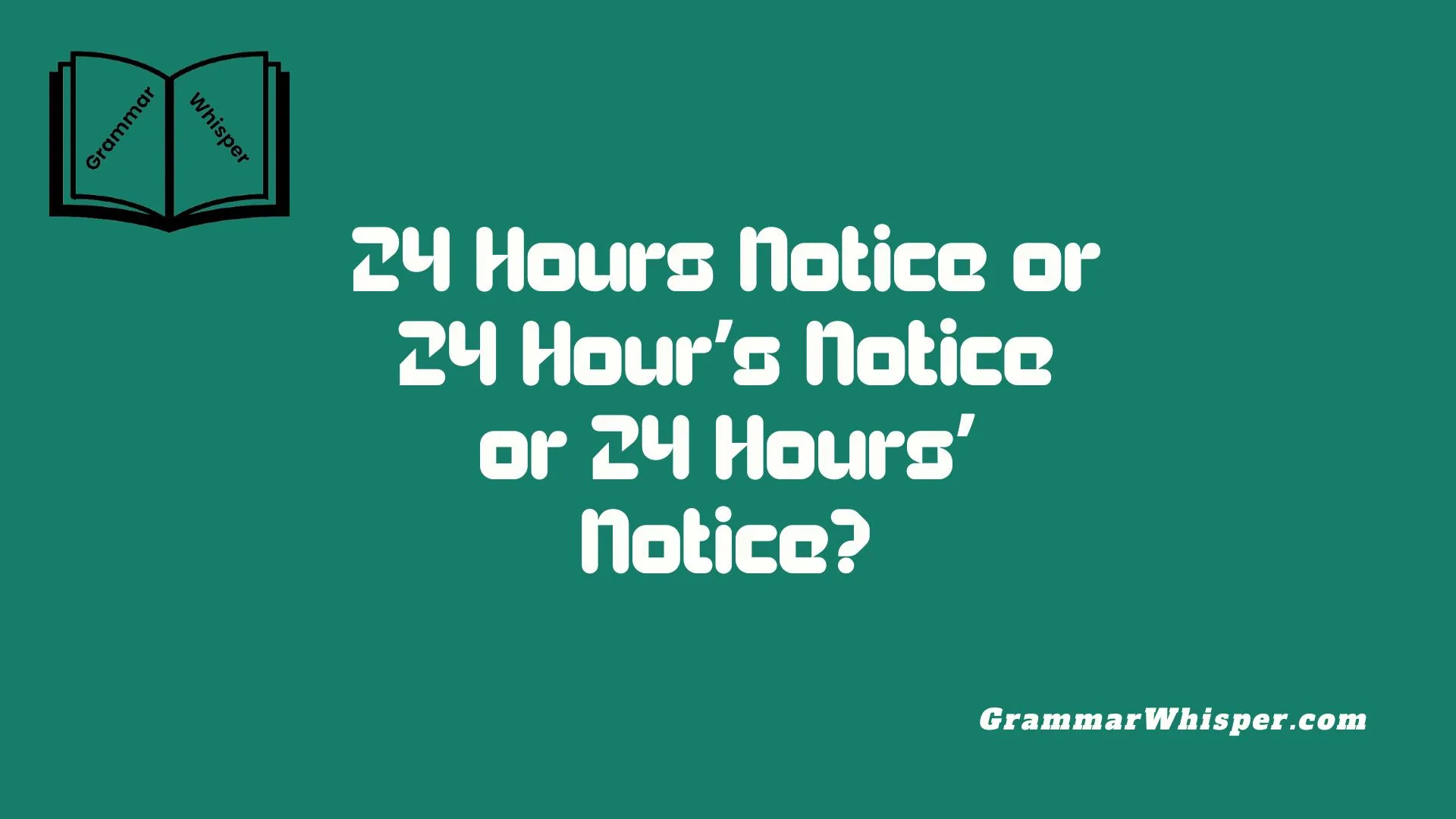When you’re handling contracts, HR tasks, or writing official memos, small grammatical choices can carry real weight. I once saw a case where a manager used “24 hour’s notice” in a staff email. That wrong form sparked debate, delays, and unnecessary confusion. The intended phrase – “24 hours’ notice” – may seem minor, but it directly ties to your credibility. These postings reflect you. A simple grammatical error in professional writing can cause more harm than you’d expect. It affects how you’re perceived, and in workplaces where precision is everything, it’s vital to get it right.
Let’s clarify this once and for all. Whether you’re new in your job or a seasoned HR specialist, using the correct form shows you’re thoughtful and competent. The difference between “hour’s” and “hours’” hinges on understanding plural possessive rules. It may seem small, but it matters more than most people think. These aren’t arbitrary grammar preferences – they’re part of professional standards. If you’ve ever had to explain this to one another at work, you know how often it pops up. And each time, it’s not just about grammar – it’s about making a solid, professional impression.
Why This Phrase Matters in Everyday and Professional English
Choosing between “24 hours notice”, “24 hour’s notice”, and “24 hours’ notice” isn’t just about grammar – it’s about clarity and professionalism. In legal documents, job postings, or lease agreements, precision matters. Imagine receiving an email: “Please give me 24 hours notice.” Without the apostrophe, it looks like a typo. That tiny omission can make you seem careless or untrustworthy.
Companies like Zillow and Glassdoor require proper notice in layoffs and relocations. Recruiters and attorneys also rely on clean phrasing to avoid misinterpretation. When you write with precision – using “24 hours’ notice” – you signal you know your stuff. It’s a small detail, but it carries big weight.
A Quick Primer on Apostrophes in English Time Expressions
Apostrophes do two things: show possession or mark contractions. In time expressions like “a day’s notice,” the apostrophe shows possession – one day possesses that notice. Misplacing or omitting it distorts meaning.
| Expression | Type | Possessive? | Correct? |
| 24 hours notice | Plural noun | ❌ | No |
| 24 hour’s notice | Singular possessive | ❌ | No |
| 24 hours’ notice | Plural possessive | ✅ | Yes |
“24 hours’ notice” uses the plural possessive. We’re talking about 24 hours owning that “notice.” Dropping the apostrophe or using a singular form breaks that logic.
Breaking Down the Three Options
“24 Hours Notice” – Missing the Apostrophe
Without the apostrophe, “24 hours notice” reads like two nouns side by side. It becomes unclear – does it refer to hours or notice itself? This error pops up in online classifieds or rushed emails. It looks sloppy and can cause readers to question the writer’s attention to detail.
“24 Hour’s Notice” – Singular Possessive Error
Using “24 hour’s notice” shows a misunderstanding. If it were one hour, you might say “1 hour’s notice,” but never “24 hour’s.” That twist leads to ungrammatical phrasing. Employees might misinterpret your meaning. It even shows up in resume templates – but it hurts credibility in professional settings.
“24 Hours’ Notice” – The Correct Form
Here’s the gold standard: “24 hours’ notice.” You use a plural noun in possessive form. That apostrophe after the ‘s’ tells readers “these hours own the notice period.” You’ll see it in rental agreements, insurance cover letters, and corporate policies.
- Legal examples: “Tenant must provide 24 hours’ notice before showing the apartment.”
- Corporate usage: “Employees are entitled to 24 hours’ notice prior to schedule changes.”
This form shows clarity and care in your communication.
The Grammar Behind Time-Based Possession
Historical Usage and Evolution in English
Time possessives date back to Middle English. Writers used phrases like “a month’s rent” or “a year’s service.” Legal and religious documents from the 14th century feature this same form. Over time, such forms became standard in professional writing. Apostrophes clarified ownership of these periods – not sequence or occurrence.
Grammar Rules That Apply Here
- Plural + ’s means possession (e.g., “the dogs’ leash”).
- Time expressions treat periods as possessing their noun:
- “Two weeks’ notice”
- “Three months’ notice”
- “One day’s rest”
- Omit apostrophe for simple plurals, but include it for possessive meaning.
Understanding this pattern helps you write more accurately and confidently.
Common Errors and Why They Happen
Misunderstanding Singular vs. Plural Possessives
Confusion often stems from forms we learned early on: “a day’s work.” We generalize that to “hours’,” forgetting that apostrophes follow plurals when showing possession.
Influence of Spoken Language and Typing Shortcuts
When people talk fast they say “Twenty-four hours notice.” Email interfaces don’t auto-add apostrophes, making digital errors common. I’ve seen HR teams issue memos with missing apostrophes, triggering follow-up emails to clarify. A tiny character can cause big confusion.
Professional and Style Guide Perspectives
What Do Experts Say?
- Chicago Manual of Style: Recommends plural possessive for time expressions.
- AP Stylebook: Uses “24-hour notice” with hyphen for modifiers, but recommends apostrophes for possessives.
- APA Style: Also supports hyphen for adjectives (“24-hour”) vs. apostrophe for possessives (“24 hours’ notice”).
Industry-Specific Preferences
- Legal field: Always “24 hours’ notice” – even in headings.
- HR documents: Prefer hyphenated form when used adjectivally (“24-hour notice period”).
- Marketing/PR: Tend to skip apostrophes, but smart copywriters keep them.
- Academia: Use hyphens for modifiers and apostrophes for possessives.
Best Practices for Writers and Professionals
When to Always Use “24 Hours’ Notice”
- Job resignation letters: “I am submitting my 24 hours’ notice.”
- Lease terminations: “Tenant shall provide 24 hours’ notice prior to vacating.”
- Official policies: “24 hours’ notice required before schedule changes.”
Avoiding Confusion in Digital Communication
Clear alternatives:
- “Please give one day’s notice.”
- “We require a 24-hour notice period.”
- “Provide notice at least 24 hours in advance.”
These options are simple, clear, and error-free.
Case Studies: Real-Life Mistakes and Fixes
Case Study 1: HR Memo Error
Problem: Company sent email: “Please submit 24 hours notice before any absence.” Impact: Staff complained they didn’t recognize it as a deadline. Resolution: Updated to “24 hours’ notice.” Clarity improved and no further confusion followed.
Case Study 2: Lease Agreement Revision
Problem: Lease read “require 24 hour’s notice for early termination.” Impact: Renter questioned validity and sought lawyer. Resolution: Corrected to “24 hours’ notice,” restoring trust and legal clarity.
Case Study 3: Email Confusion in Tech Team
Problem: Manager wrote “deadline is 24 hours notice.” Impact: Team submitted late, thinking they had more time. Resolution: Revised to “provide notice at least 24 hours in advance,” avoiding the technical possessive and improving understanding.
Final Word
In a world of auto-correct and fast typing, it’s easy to overlook a small punctuation mark like an apostrophe. But when it comes to professional communication – especially anything tied to contracts, policies, or legal standards – precision matters.
Using “24 hours’ notice” shows attention to detail, understanding of grammar, and respect for your audience’s time and expectations.
When in doubt, remember:
If the time span owns the notice, give it the apostrophe it deserves.
FAQs
What is the correct form: 24 hours notice, 24 hour’s notice, or 24 hours’ notice?
The correct form is “24 hours’ notice” – with an apostrophe after the s. This shows possession, meaning the notice belongs to a time span of 24 hours. “24 hour’s notice” is incorrect because it implies only one hour, and “24 hours notice” lacks the possessive apostrophe, making it grammatically incomplete.
Can I use “24-hour notice” instead of “24 hours’ notice”?
Yes, you can use “24-hour notice” when it’s functioning as a compound adjective before a noun (e.g., “24-hour notice period”). However, if you’re referring to the notice that belongs to a time period, especially in legal or formal writing, “24 hours’ notice” is the grammatically precise form.
Why is the apostrophe important in “24 hours’ notice”?
The apostrophe indicates possession – the notice is “owned” by the 24-hour time frame. Without it, the phrase becomes vague or grammatically incorrect. In professional settings like contracts, HR policies, or rental agreements, accuracy in terms like “24 hours’ notice” is essential.
Is “24 hours’ notice” used in legal documents?
Yes. The phrase “24 hours’ notice” is commonly used in legal, employment, and rental contracts. For example, many landlord-tenant laws require landlords to provide 24 hours’ written notice before entering a rental unit. It’s also standard in employment termination clauses and service agreements.
How can I avoid mistakes when writing “24 hours’ notice”?
To avoid grammatical errors:
- Always ask if the time span owns the noun (if yes, use the apostrophe).
- Use “24-hour” only as an adjective.
- Consider rephrasing: “at least 24 hours in advance” or “a 24-hour notice period.”
- Refer to grammar guides or style manuals like Chicago Manual of Style for confirmation.











